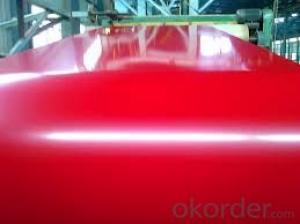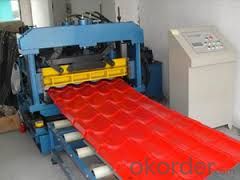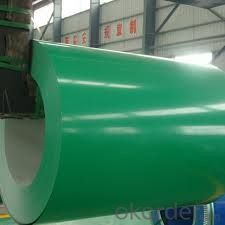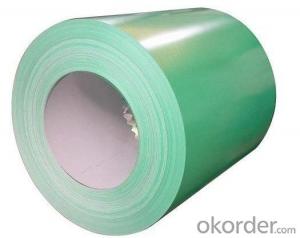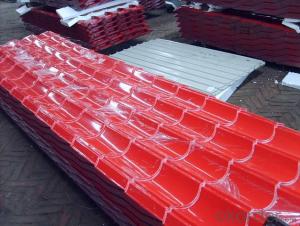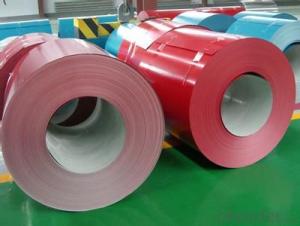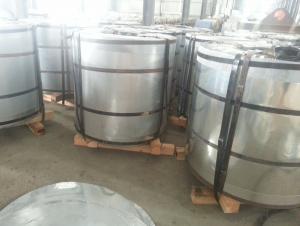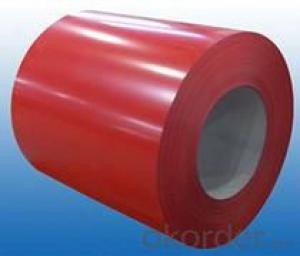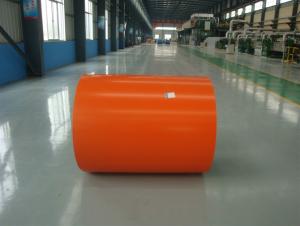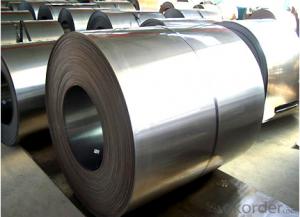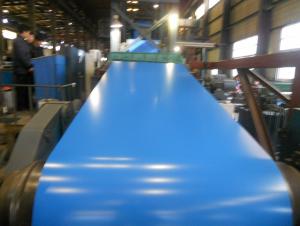Pre-Painted Galvanized Steel Coil/Construction Purposes
- Loading Port:
- Shanghai
- Payment Terms:
- TT OR LC
- Min Order Qty:
- 25 m.t.
- Supply Capability:
- 10000 m.t./month
OKorder Service Pledge
OKorder Financial Service
You Might Also Like
Product Description
Prime CGCC RAL DX51D Z60 Z100 Color Coated Steel/ PPGI/Color Prepainted Galvanized Steel Coil(China)
FOB Price: US $630 - 938 / Ton Get Latest Price
Min. Order Quantity: 15 Ton/Tons
Supply Ability: 5000000 Ton/Tons per year
Port: Qingdao, Tianjin, China
Payment Terms: L/C, T/T, Western Union
Contact Supplier
Company Information
Quick Details
Standard: AISI, ASTM, BS, DIN, GB, JISGrade: SGCC SGCD SGCH DX51D/52D/53DThickness: 0.22-1.0 mm
Place of Origin: Tianjin China (Mainland)Model Number: CGCC CGCL PPGI PPGLType: Steel Coil
Technique: Cold RolledSurface Treatment: CoatedApplication: Container Plate
Special Use: Wear Resistant SteelWidth: 750-1250mmLength: Coil Or Sheet (780-6000 mm ) can be done as your requirements.
Exporting Ability: 500 20ft container/each monthZinc Coating: Z40--Z180g/m2Painting: Front side paint thickness: 15-25μ M (bottom paint + top paint)
Sample: Offer Free Sample For Quality TestContainer Info: One 20ft container can hold 26tons MaxColor: As the RAL color chart
Coil I. D: 508/610 mmCoil Weight: 3.5-8 tons/each coilOther Poducts: Cold rolled, galvanized steel coils
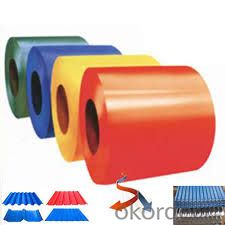
- Q: Can steel coils be welded together?
- Yes, steel coils can be welded together. Welding is a common technique used to join metals, including steel coils. It involves melting the edges of the coils and fusing them together using a filler material. This process creates a strong and durable bond between the coils, allowing them to be joined and used as a single unit. Welding steel coils together is commonly done in various industries, such as manufacturing, construction, and automotive, to create larger structures or components. However, it is important to ensure proper welding techniques and quality control measures are followed to ensure the integrity and strength of the weld joint.
- Q: - I'm considering doing my physics coursework on the uses of Mild Steel in skyscrapers and construction, would this be right? Some sources tell me mild steel is too weak, others say it is fine
- Mild steel doesn't really mean anything, technically. In today's world all steel is mild steel unless it's high carbon or alloy, which are mostly tool steels. You'll need to study steel much deeper than that to accomplish any real physics work relating to steel.
- Q: How are steel coils used in the automotive industry?
- Steel coils are used in the automotive industry to manufacture various components, such as body panels, frames, and suspension parts. These coils are transformed into flat sheets or molded into different shapes to meet the specific requirements of each component. The high strength and durability of steel make it an ideal material for ensuring safety and structural integrity in vehicles.
- Q: How are steel coils used in the manufacturing of defense equipment?
- Steel coils are used in the manufacturing of defense equipment as they provide the necessary strength, durability, and flexibility required for various applications. These coils are often processed and shaped into components such as armor plates, vehicle frames, ammunition casings, and other structural parts. The high tensile strength and resistance to impact and deformation make steel coils an ideal material for protecting military personnel and assets, ensuring the reliability and effectiveness of defense equipment.
- Q: How are steel coils used in the production of telecommunications equipment?
- The production of telecommunications equipment commonly involves the use of steel coils, which offer structural support and durability. These coils are utilized to fabricate different components, including cabinets, racks, and enclosures. A significant application of steel coils in telecommunications equipment is seen in the manufacturing of cabinets. These cabinets serve as housing for the delicate electronic components and wiring utilized in telecommunications systems. Steel coils are typically shaped to form the cabinet structure, providing a robust and dependable enclosure for the equipment. The steel material also offers protection against external factors such as impacts, dust, and moisture, ensuring the longevity and integrity of the telecommunications equipment. Steel coils also find application in the production of racks for telecommunications equipment. These racks are designed to organize and provide accessibility to multiple devices, including servers, switches, and routers. The strength and rigidity of steel coils make them an ideal material for constructing these racks, ensuring they can bear the weight of multiple devices and withstand the constant handling and movement that occur in telecommunication environments. Moreover, steel coils are used to manufacture enclosures for telecommunications equipment. These enclosures act as protective casings, safeguarding sensitive electronic components from external influences such as electromagnetic interference and physical damage. Steel coils are often formed into specific shapes and sizes to create these enclosures, providing a sturdy barrier that shields the equipment from various external threats. In conclusion, steel coils play a crucial role in the production of telecommunications equipment by offering structural support, durability, and protection. They are employed in the creation of cabinets, racks, and enclosures, which ensure the proper functioning and longevity of the sensitive electronic components used in telecommunication systems.
- Q: Is there a difference between hot rolled and cold rolled steel coils?
- Yes, there is a significant difference between hot rolled and cold rolled steel coils. Hot rolled steel coils are produced at high temperatures and are typically used for applications that require malleability and ductility. On the other hand, cold rolled steel coils are produced at room temperature and undergo a process that results in a smoother, more precise finish. Cold rolled steel coils are often used in applications that require a higher degree of strength and surface quality.
- Q: I mean about if I had a piece of metal, how can i decide that's iron or steel?Sorry for bad English.
- Iron and steel have different thermal expansions and specific heats. You could either heat it up and see how much it changes in length or you could put it in water inside a calorimeter and observe how much the temperature of the water changes
- Q: i want to know what is light gauge steel and the diffrences between light gauge steel and steel for roof truss.
- as a welder i can answere this. wel i think i can after 2 years of classes. so...light guage steel usually referes to the THICKNESS of the metal. also known as SHEET METAL. the only diffrences between light guage and roof truss is that a truss will be thicker metal ex- an i-beam for a structure is usually 1/2inch or 3/8 for smaller buildings. also there is no such thing as light weight steel. steel is steel the only thing that determins its weight is its size/thickness aluminum is a whole nother ballgame. ever see a pound of aluminum vs. a pound of steel? aluminum can be 1/2 or less the weight of steel. but its tensile strength suffers EX. say steel will snap at 70,000 pounds, aluminum will snap at 40,000 pounds, if it even snaps that is! it just tends to bend like rubber. aluminum is handy for many things because it will not rust.
- Q: What are the common processing defects in steel coils?
- The common processing defects in steel coils include surface imperfections such as scratches, dents, and stains, as well as edge wave, coil set, camber, and crossbow. Other defects may include coil breaks, oil spots, rust, and uneven thickness or width variation.
- Q: What are the common coil processing equipment used in the industry?
- Some common coil processing equipment used in the industry include coil slitting machines, coil winding machines, coil straighteners, coil feeders, and coil cradles. These machines are used to cut, shape, and feed metal coils in various manufacturing processes.
Send your message to us
Pre-Painted Galvanized Steel Coil/Construction Purposes
- Loading Port:
- Shanghai
- Payment Terms:
- TT OR LC
- Min Order Qty:
- 25 m.t.
- Supply Capability:
- 10000 m.t./month
OKorder Service Pledge
OKorder Financial Service
Similar products
Hot products
Hot Searches
Related keywords
